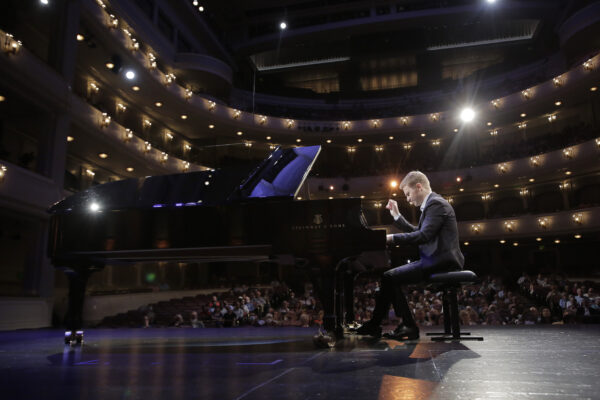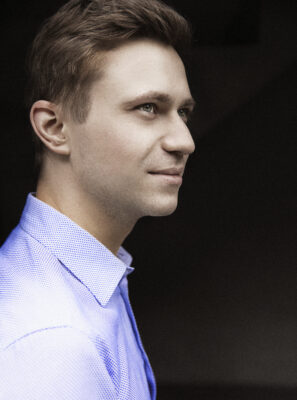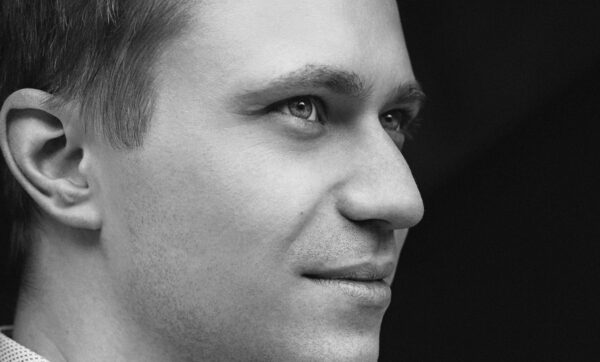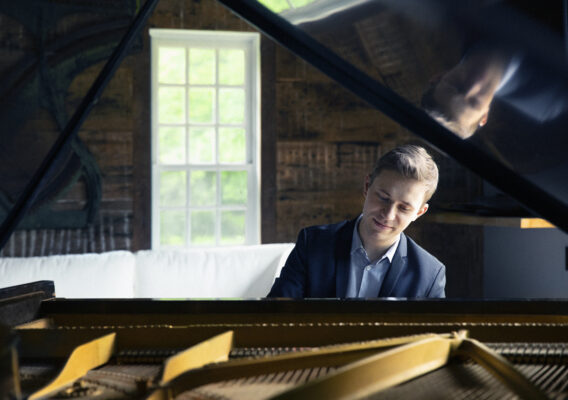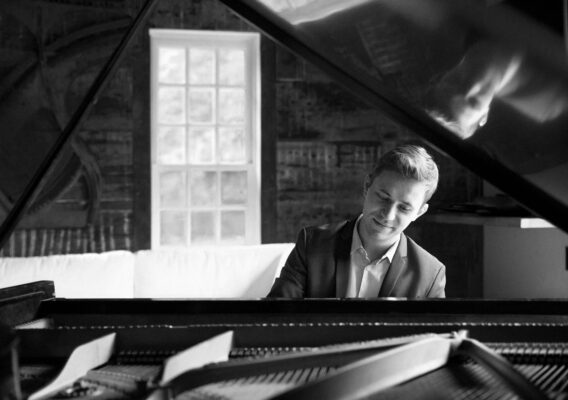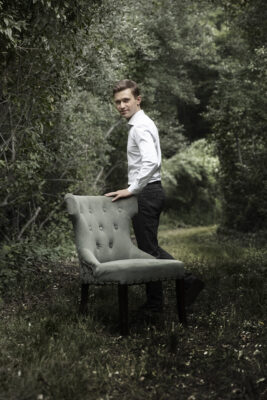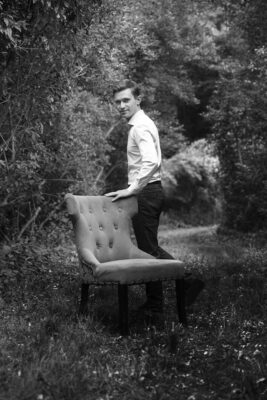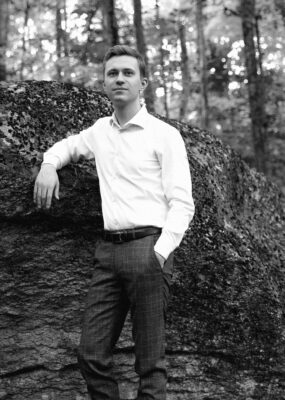Dmytro Choni
PianoIn June 2022 Dmytro Choni won the Bronze Medal of the 16th Van Cliburn International Piano Competition, one of the most prestigious piano competitions in the world. Previously he already garnered international attention by winning numerous top prizes and awards at among others the Paloma O’Shea Santander International Piano Competition (Spain, 2018), the Leeds International Piano Competition (Great Britain, 2021) and the Bösendorfer USASU (USA, 2019). Notwithstanding these achievements, Dmytro says: “Being successful for me means to continuously grow as a musician and as a person, and not to stop searching for the truth in music. In my opinion, the most important aspect would be to love the music with all your heart.”
Read more“His art of phrasing, his lyricism, the nuances and the perfect control of dynamics, the transparency and, if necessary, the stupendous virtuosity are outstanding. His playing thus always emanates the aura of the highest artistic goal and finest sensitivity.” – Pizzicato
“Rare is the musician with so natural a feeling for rubato, the expressive give and take of pace, as well as color and texture.” – The Dallas Morning News
In June 2022 Dmytro Choni won the Bronze Medal of the 16th Van Cliburn International Piano Competition, one of the most prestigious piano competitions in the world. Previously he already garnered international attention by winning numerous top prizes and awards at among others the Paloma O’Shea Santander International Piano Competition (Spain, 2018), the Leeds International Piano Competition (Great Britain, 2021) and the Bösendorfer USASU (USA, 2019). Notwithstanding these achievements, Dmytro says: “Being successful for me means to continuously grow as a musician and as a person, and not to stop searching for the truth in music. In my opinion, the most important aspect would be to love the music with all your heart.”
In February 2024 Dmytro Choni made his debut with the Orchestra Sinfonica Nazionale della Rai in Turin, replacing at short notice Yefim Bronfman, performing Brahms’ piano concerto no. 1 conducted by Juraj Valčuha. (“Choni has all the right cards to deal with the right spirit of the opening Maestoso, torn between the dramatic opening motif for the orchestra and the piano writing of an often dreamy and introverted nature, finding the right balance between the poetry of the second theme, surrounded by dialogues with the woodwind and horn, and the energy of the development, where the thirty-year-old Ukrainian knows how to deliver the punch of the thoroughbred virtuoso, without renouncing the sense of measure that is his stylistic hallmark. Nor is there any lack of ability to recreate the magical, suspended atmosphere of the Adagio, one of the peaks of Brahms’ inspiration, with its expressive depth recreated with a few touches of cantabile, at times sorrowful, at times luminous, sustained by a shrewd use of the pedal and an immediate understanding with the orchestra led by Juraj Valčuha.” – L’Ape musicale).
Dmytro Choni started the 2023/24 season with his highly successful recital debut at the Lucerne Festival (“The highlight of the program was Scriabin’s fourth sonata, which polarised and blended both introverted and extroverted playing. Magnificent how Choni transformed the longing pull of the notes into virtuoso drive.” – Luzerner Zeitung), followed by his return to the Palau de la Música in Barcelona to open their piano series season (“His pianism is technically impeccable, with a definite strength of articulation and pedal control that avoids excessive overlapping of sounds.” – Revista Musical Catalona) and his debut with the Badische Philharmonie Pforzheim and Robin Davis.
The start of the season also marked a new partnership with Frank Peter Zimmermann with recitals in among others Munich and various cities in Italy. They also made a start of a first recording together for BIS Records, featuring works by Bartók and Szymanowski.
Future highlights include solo recital debuts in Düsseldorf, Hamburg and Hannover, in the new Bechstein Hall in London, concerts in various cities in the US, recital tours in Korea and China, as well as his debut with the Vienna Chamber Orchestra and the Polish Chamber Philharmonic Orchestra, as well as the close of his residency in the Edesche Concertzaal with recitals with Josef Špaček and Julian Steckel.
His debut album was released by Naxos in 2020, containing works from the 20th century by Debussy, Ginastera, Ligeti and Prokofiev. The CD received a “Supersonic Award” by Pizzicato magazine and was highly acclaimed by the international press saying that “Dmytro Choni’s thoroughbred playing already possesses real greatness and ingenious breath” (Pizzicato); “The young man could be one of the 21st century’s most outstanding pianists.” (David’s Review Corner).
Dmytro Choni appeared as soloist with renowned orchestras, including the Royal Liverpool Philharmonic, Fort Worth Symphony Orchestra, Phoenix Symphony, RTVE Symphony, Ensemble Esperanza, Ukraine National Symphony, Youth Symphony Orchestra of Ukraine, Castilla y León Symphony, Liechtenstein Symphony, Hamburger Camerata, Silesian Philharmonic and Dominican Republic National Symphony, working with conductors such as Andrew Manze, Marin Alsop, Nicholas McGegan, Yaron Traub, Baldur Brönnimann, Pablo González, Oksana Lyniv and Lucas Macías Navarro.
He takes part in festivals such as the Kissinger Sommer, Verbier Festival, Beethovenfest Bonn, Chopin Duszniki International Piano Festival, New Ross Piano Festival, Dubrovnik Summer Festival, Stars and Rising Stars Munich and MiTo Settembre Musica and performs in such venues as the Wigmore Hall London, Carnegie Hall New York, Salle Cortot Paris, Musikverein and Konzerthaus in Vienna, Minato Mirai Hall Yokohama, Flagey Brussels, Palau de la Música Barcelona, Auditorio Nacional de Música Madrid and the Teatro Colón Buenos Aires.
Chamber music also forms an important part of his musical activities. He has collaborated with the Cuarteto Quiroga, Quartetto di Cremona, Calidore String Quartet and with violinists Rudens Turku, Jack Liebeck, Andrej Bielow and Mari Samuelsen, clarinettist Sharon Kam and violist Nils Mönkemeyer.
Dmytro Choni was born in Kyiv, Ukraine in 1993. He was four when he received his first piano lessons from Galina Zaslavets. Later, he went on to study in Kyiv with Nina Naiditch and Prof. Yuri Kot and consequently finished his studies with Prof. Dr. Milana Chernyavska at the University of Music and Performing Arts in Graz.
Representation
General Management: Nymus Artists
Austria: Mark Stephan Buhl – Artists Management
United States: The Cliburn
Concerts
- June 7, 2024, 7:30 pm
Hamburg, Germany
Elbphilharmonie, Kleiner Saal
Recital
Debussy – Et la lune descend sur le temple qui fut
Debussy – Prélude "Les Collines d'Anacapri", Book 1 no. 5
Debussy – Prélude "Des pas sur la neige". Book 1 no. 6
Debussy – L’Isle Joyeuse
Schumann – Piano Sonata no. 2 in g minor, op. 22
Prokofiev – Sarcasms, op.17
Silvestrov – 4 Pieces, op. 2
Liebermann – Gargoyles, op. 29
https://www.proarte.de



